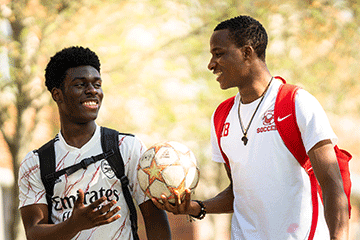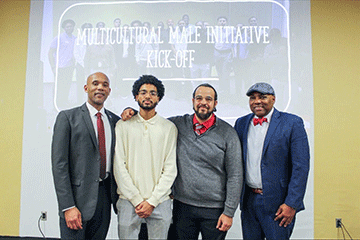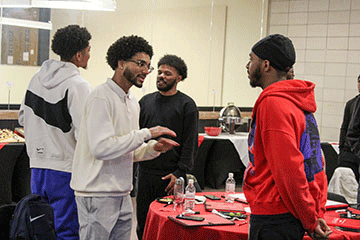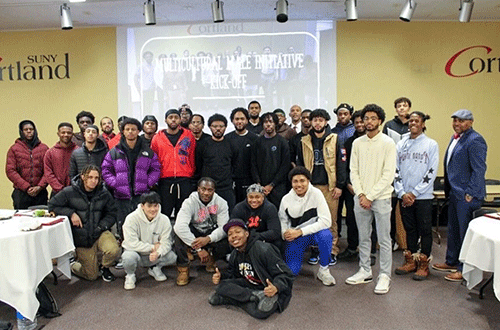
03/04/2024
Nationwide, students of color, especially Black and Latino males, have relatively low graduation rates and high transfer rates from their first college institutions.
One SUNY Cortland senior wants to break those cycles and help young men navigate their experience at Cortland through graduation by spearheading the restart of the Multicultural Male Initiative (MMI), a college mentoring program designed six years ago.
“The point of this is brotherhood,” said senior psychology major James Escolastico of the Bronx, N.Y. “This is the community we’re trying to build: places for people who look like me to have fun, enjoy themselves and get a feeling of what home may feel like for them.”
The organization faded out during the pandemic. In early February, Escolastico addressed some 25 male students of all backgrounds at a mixer event in Corey Union Exhibition Lounge, kicking off the revitalized MMI.

Escolastico was accompanied by two SUNY Cortland alumni mentors, Jacob Wright ’18, career services career coach and educator, and Kharmen Wingard M ’11, assistant director of the Educational Opportunity Program. James Felton III, the university’s former chief diversity officer, attended in a demonstration of support.
According to recent Integrated Postsecondary Education Data System statistics, white males graduated within a six-year span at a rate of 64%, compared to 52% and 50% for Latino and Black males, respectively.
At Cortland, MMI assigns upper-class members to mentor newer students for one internship credit, according to Escolastico and Wright. The student mentors provide their mentees with regular check-ins, serve as a source for advice and guide students to campus resources. Graduate students are welcome.
“Having a mentor is one of the best things anyone can do for their professional and academic development,” Wright said. “In the program, you will build leadership skills, gain community and have fun. MMI will help you learn how to navigate Cortland and, more importantly, build a meaningful and successful life.”

MMI also hosts events for professional development, educational opportunities and days to foster community around campus.
The three co-founders of the new program hope it will continue to impact the campus community for years to come. They are working to have enough members to take trips to New York City, have conferences with schools across the state and have full-time staff.
Escolastico encourages students to offer suggestions for potential future events and ways to increase membership and participation.
Under its past leadership, MMI held many events, including a yearly Men of Color Student Leadership Summit. These events have attracted participants from 26 universities, high schools and church congregations. MMI’s positive campus community impact led to Cortland’s Institutional Equity and Inclusion Office winning the HEED award and the project was included as a reference for SUNY programs to improve diversity.

Under Felton, the MMI was created with the help of another student who has since graduated, Christopher Venant ’19.
Escolastico has been carrying the torch since. He looks back on a time in his college career when he felt very lonely and discouraged and even considered transferring out. MMI gives him a way to help both himself and his classmates.
“Do it out of love,” he said. “You have to love the people who look like you, who come from your culture, and if you’re going to be in a place where you’re the minority, you must stick together because you can’t fight those battles alone.”
As the Student Government Association representative for a diversity club, “Know Your Roots,” that dissolved post-COVID, Escolastico is also an active member of most Cortland Voice Office clubs. He eventually wants to become a therapist, working with Black men and women and focusing on mental health counseling.
He was introduced to the idea of the MMI while interning with Wright as a career peer mentor, helping Cortland students and alumni build resumes. Wright explained the program’s history and asked if he’d be interested in reviving it.
Escolastico jumped at the opportunity.
“James (Escolastico) has been invaluable to the revitalization of MMI,” Wright said. “Throughout his time at Cortland, he has built several relationships with others, which has helped build interest and engagement among our students.”
Wright and Wingard, who co-chair the program, broke down MMI’s details for students, worked to garner alumni support, acquired funding and identified event locations.

“A common theme that caused (Black students) to leave is a feeling of isolation and a lack of support/community,” Wright said, describing his own experience as a Cortland student. “This program addresses the lack of connection that men of color experience on our campus through mentorship.”
Venant, now employed in New York City as a finance/real estate property accountant with First Service Residential and as a part-time DJ for private events, is proud that the renewed MMI is growing and evolving.
“There’s not a lot of us,” Venant said of male students of color. “We had to make sure we leveraged the resources and the people (at Cortland) to their full capacity to truly be able to continue doing so even when we’re gone.
“That's what MMI is about, the foundation of it: genuine connections from people that look and sound like us, trying to make a start in their own direction.”
Prepared by communications writing intern Jean-Andre Sassine Jr. '23